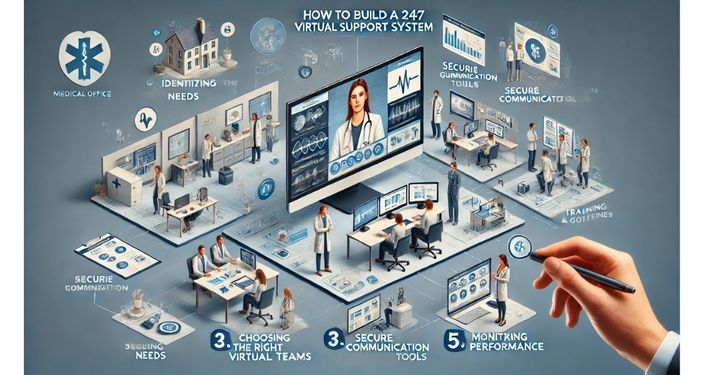Running a medical office means dealing with urgent patient needs, appointment scheduling, insurance claims, and a never-ending stream of administrative tasks. But what happens when the office closes for the day? Patients don’t stop needing assistance just because it’s after hours. Emergencies, inquiries, and follow-ups still need attention.
This is where virtual staff step in. With the right setup, medical offices can provide seamless 24/7 support without overburdening in-house teams or hiring costly overnight staff. Whether it’s handling patient calls, managing records, or processing insurance claims, virtual professionals can keep everything running smoothly—even while the physical office is closed.
So, how can medical offices make this work? Let’s break it down.
The Role of Virtual Staff in Medical Offices
Virtual staff aren’t just for answering phones—they can take on a wide range of essential responsibilities. With proper training and access to the right systems, healthcare virtual assistants can become an extension of your in-house team. Here’s what they can handle:
1. After-Hours Patient Support
Patients often have urgent questions about prescriptions, symptoms, or upcoming appointments. A virtual receptionist or nurse triage service can:
- Answer calls and messages – Ensuring patients don’t feel ignored outside of business hours.
- Provide basic medical guidance – Directing non-urgent cases to online resources or scheduling follow-ups.
- Transfer emergency calls – Connecting critical cases to on-call doctors or emergency services.
2. Appointment Scheduling & Reminders
Virtual assistants can manage appointment bookings around the clock, helping reduce no-shows and keep schedules organized. They can:
- Confirm appointments – Sending automated reminders via phone, text, or email.
- Reschedule as needed – Handling last-minute cancellations and adjustments.
- Manage waitlists – Keeping track of patients who want earlier slots and filling last-minute openings.
3. Medical Billing & Insurance Processing
Dealing with insurance companies and processing claims is time-consuming. Virtual medical billing specialists can:
- Submit insurance claims – Reducing errors and ensuring quicker reimbursements.
- Follow up on unpaid claims – Tracking down payments to prevent revenue loss.
- Verify patient insurance – Checking coverage details before appointments.
4. Electronic Medical Records (EMR) Management
Keeping patient records accurate and up to date is critical for quality care. Virtual staff can:
- Update patient files – Entering new information and ensuring accuracy.
- Retrieve records – Organizing and pulling up charts for in-house staff.
- Maintain compliance – Ensuring records meet legal and regulatory standards.
5. Customer Service & Patient Follow-Ups
Great patient care doesn’t stop after a visit. Virtual teams can handle post-appointment support by:
- Checking in with patients – Following up on recent treatments or procedures.
- Handling prescription refills – Coordinating with pharmacies for renewals.
- Addressing patient concerns – Resolving billing inquiries or clarifying instructions.
How to Build a 24/7 Virtual Support System

The key to a successful virtual staffing setup is having the right structure in place. Here’s how medical offices can effectively implement 24/7 support:
1. Identify Your Office’s Needs
Before hiring virtual staff, assess what areas need the most support. Are patients frequently calling after hours? Are billing delays causing revenue issues? Understanding these pain points will help determine which roles to prioritize.
2. Choose the Right Virtual Team
Not all virtual staff have medical experience, so hiring professionals with a background in healthcare administration or medical assistance is essential. Many virtual assistants specialize in medical office tasks, ensuring they understand HIPAA regulations and patient confidentiality requirements.
3. Use Secure Communication & Management Tools
To work effectively, virtual staff need access to the right platforms. Secure cloud-based systems allow remote professionals to:
- Log into EMR systems – Updating records without compromising security.
- Answer patient calls and messages – Using VoIP services or online chat tools.
- Manage scheduling – Accessing appointment software in real time.
4. Provide Proper Training & Guidelines
Even experienced virtual staff need training on office-specific processes. Creating clear guidelines on handling patient interactions, scheduling protocols, and data privacy will ensure consistency in service quality.
5. Monitor Performance & Adjust as Needed
Regular check-ins and performance evaluations help maintain high standards. Tracking key metrics like patient satisfaction, response times, and billing accuracy will identify areas for improvement.
The Benefits of 24/7 Virtual Support for Medical Offices
Implementing round-the-clock virtual support doesn’t just ease the workload for in-house staff—it also improves overall patient experience.
- Better Patient Satisfaction – Patients appreciate immediate responses and seamless scheduling.
- Increased Efficiency – Reducing administrative bottlenecks allows medical professionals to focus on patient care.
- Lower Costs – Hiring virtual staff is more affordable than maintaining a full in-house night shift.
- Reduced No-Shows & Cancellations – Automated reminders and after-hours scheduling keep the calendar full.
- Stronger Revenue Flow – Faster insurance claims processing and payment follow-ups improve cash flow.
Taking Patient Care to the Next Level
A 24/7 support system isn’t just a luxury for medical offices—it’s quickly becoming a necessity. Patients expect timely assistance, and with the right virtual staff in place, medical offices can deliver high-quality service around the clock without overextending their resources. By integrating trained virtual professionals into daily operations, medical offices can enhance efficiency, reduce administrative burdens, and ensure patients always have the support they need.










